
![]()
|
Commonly
treated conditions include:
The
Demonstration of Acupuncture Treatment
The acupuncture on foot could solve many foot pain which your podiatrist can't do.
What Is Acupuncture and Oriental Medicine? Acupuncture and Oriental medicine has been used as healing arts for over 2,500 years. The general theory is based on the premise that there are patterns of energy flow called Qi(pronounced chee) throughout the body which are related to the organs and tendinous-muscular system. when the energy flow is disrupted due to trauma, poor appetite, medications, stress, or other conditions, pain or illness result. Acupuncture focuses on correcting these imbalances of energy flow by inserting ultra-thin needless under the skin to stimulate specific points in the body. Stimulation unblocks the channels and encourages an even flow of Qi, restoring the body's balance and relieving pain and other symptoms. Acupuncture and Oriental medicine is one of the newest primary health care professions in the United states. The benefits of acupuncture have become widely recognized and integrated with mainstream health care. Acupuncture's complex system of diagnostic methods take into consideration the person as a whole, not just isolated symptoms. Acupuncture practiced is based upon discerning the body's "pattern off disharmony" and treating accordingly. Acupuncture and oriental medicine treats and strengthens the physical conditions, normalizes physiological functions, and controls pain. The aim is not just to eliminate or alleviate symptoms, but rather to treat the underlying cause, increase the ability to function, and improve the quality of life. Since the 1970s when acupuncture and Oriental Medicine first became available in the United States, over 15 million Americans have tried it. Almost everyone knows someone who has had positive results. the risk is low and potential benefits are high. Knowing what to expect from acupuncture treatments can make a difference in the experience. What is modern Chinese medicine? Modern Chinese
medicine is a combination of Western and traditional Chinese medicine's
diagnosis, using acupuncture and Chinese herbs for the treatment.
All the diagnoses and treatment in addition to your family physician
or specialist's diagnosis, also What
are the benefits of Acupuncture? 2)
Reducing spasm. Relieves and soothes the muscles
and allows the organs to relax, so you can treat diseases like fibromyalgia,
asthma, abdominal cramps, etc... 6) Increasing
the serontonin level in your brain which is the nature neurochemical
transmitters could make your mood change like anxiety, depression. What
are the benefits of Chinese herbs?
Being informed and understanding what to expect from acupuncture treatment from the beginning will make your experience more comfortable and less apprehensive. Determine
Your Goals Selecting a Practitioner Are you looking for a MD/DO physician acupuncturist with a training of 300 hours, no test needed or through a complete oriental medicine's education for at least four years with acupuncture and Chinese herbal medicine's clinical training not less 800 hours at school or hospital plus a competency test from Acupuncture Committee of State Board or National Certification Commission for Acupuncture and Oriental Medicine(NCCAOM)? How many years of his/her experiences? What his/her specialty? Do they have reputation from your friend, your relatives or your Doctor? What credentials could provide you? Upon receiving those information, should help you to make a right decision. What is the Chinese Herbal therapy?
Chinese herbs consist of a variety of naturally found products that promote health. The herbs may be dispensed in pills, capsules, powders, tinctures, or in raw form, which requires boiling as a tea. Most herbal formulas formulas consist of four to fourteen or sometimes up to eighteen herbs and treat a wide variety of symptoms while stimulating the body's natural healing process.
What
is the Acupuncturist's Diagnosis?
The number of treatments depends upon the duration, severity and nature of your complaint. Two or three treatments may be sufficient for an acute condition, while a series of 5 to 15 treatments may be needed to resolve chronic conditions. Some degenerative conditions may require ongoing treatments over a long period of time. The following techniques may be included with your treatment: moxibustion(burning herbs), cupping(suction), auricular therapy (ear acupuncture), tui na(manipulation) and acupressure. Patients should evaluate their progress after each session. Some relief should be apparent in two or three sessions, or six to eight sessions for more pervasive conditions. If you see encouraging signs, stick with it. Ask your practitioner questions about your treatment and improvement. If your response to treatment is not satisfactory, the practitioner may consider further diagnostic exams, modify the treatment plan, or refer to an appropriate practitioner, if necessary. Who can benefit from Acupuncture treatment? Patients of acupuncture range from infants to senior citizens. They may be seeking an alternative to western medicine or it may be their last hope for relief, having exhausted all western methods for treating a chronic condition. Acupuncture offers a low risk form of treatment with few side effects, and is usually worth a try. How to find your own acupuncture Doctor?
Above information just in general from my personal experiences for you to choose a competent practitioner. In addition, the feeling of your personal contact is also important. If all above information can't get it in full, sometimes an office visit through a consultation first is helpful. |
![]()

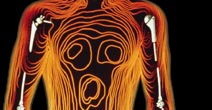
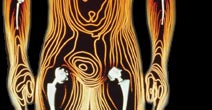
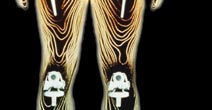
![]()
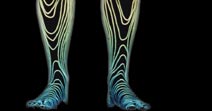
We now provided the acupressure/massage service for the people who has needle phobia.
Announcement:
This is to announce that I am the first one received the new license-practitioner
of oriental medicine from Medical Board of PA. License number OM000011.
This is the new license issued from PA State Government to protect our
consumers could be treated by a real qualified medical practitioner whose
background and competency has been evaluated and passed by the medical
board.
This new license is not only entitled the practitioner could practice
acupuncture but also in herbal medicine, nutritional consultation, diet
and life style change to match the philosophy of oriental medicine. Previously,
this part was belong to the scope of practice under the title of acupuncturist,
however, some of this practitioner even not received the herbal education
or exam to prove their competency in the field of herbal medicine. Now,
it is my pleasure to see the Board moved toward the right direction to
protect our consumers.
From now on, if the patients concerned the safety of drug/herbs interaction
or the side effects of herbal medicine, or looking for a practitioner
who really know how to treat a people's health by a holistic approach
in using acupuncture with the herbs etc. then please come to the right
door, let me help you.

Beijing University of Chinese
Medicine. There are 9 majors in the university and the Chinese Medicine
major needs take 7-year program. There are a total of 16,160 students
in the campus. Among which 356 students are doctorate degree candidates.
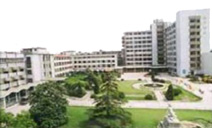
Long Hua Hospital-The Leading
TCM Hospital in Shanghai
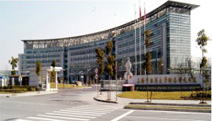 One
of the three largest TCM hospital in Shanghai . It is divided into two
parts: eastern and western branch. The eastern branch, Pudong New Area,
was opened on Apr. 23, 2005. It has the capacity of 720 beds.
One
of the three largest TCM hospital in Shanghai . It is divided into two
parts: eastern and western branch. The eastern branch, Pudong New Area,
was opened on Apr. 23, 2005. It has the capacity of 720 beds.
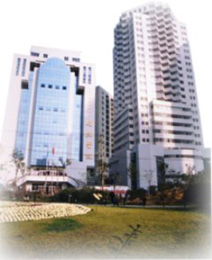
The western branch of Shuguang
Hospital located in the central city and its capacity of 600 beds.
Main Office:
Tao's Acupuncture & Herbs Center
Chung-Hu Tao, L.AC. & L.OM.
Tel. & Fax. 610-770-6201
1251 S. Cedar Crest Blvd., Suite #110A,
Allentown, PA 18103
E-mail address: chungtao@msn.com
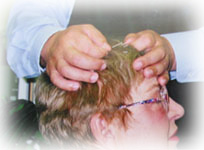 No.
1
No.
1 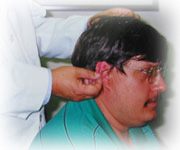 No.
2
No.
2 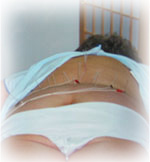 No.
3A
No.
3A No.
3B
No.
3B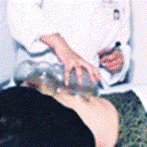 No.
3C
No.
3C No.
4
No.
4 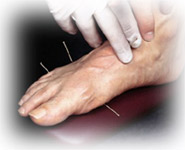 No.
5
No.
5 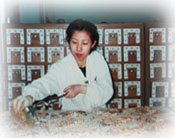 Simply
speaking, either the patent's formula or the prescribed raw herbs
from decoction is more powerful than most of the nutritional supplements
you could get from health food store. In China, you often can read
about a famous herbalist, who used his prescribed herbs, to save
a patient's life. The herb is easier for patients to take, particularly
for internal diseases. Above all, these Chinese herbs are much less
toxic than some drugs. Please note approximately 100,000 Americans
die annually from taking prescription drugs. This is a powerful
and also a safe way to improve your health, however always consult
a qualified Chinese herbalist beforehand.
Simply
speaking, either the patent's formula or the prescribed raw herbs
from decoction is more powerful than most of the nutritional supplements
you could get from health food store. In China, you often can read
about a famous herbalist, who used his prescribed herbs, to save
a patient's life. The herb is easier for patients to take, particularly
for internal diseases. Above all, these Chinese herbs are much less
toxic than some drugs. Please note approximately 100,000 Americans
die annually from taking prescription drugs. This is a powerful
and also a safe way to improve your health, however always consult
a qualified Chinese herbalist beforehand. 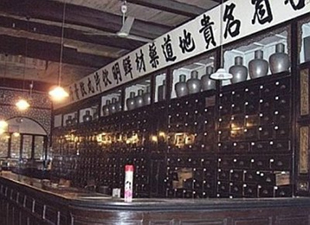
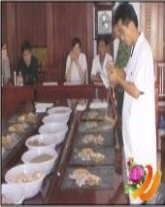 Peoples
are waiting for the bulk herbs packed by the skilled herbal worker.
Peoples
are waiting for the bulk herbs packed by the skilled herbal worker.
 The
herbs need sorted well and checked by the skill herbal worker again
before package.
The
herbs need sorted well and checked by the skill herbal worker again
before package.
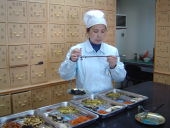 The
skilled herbal worker is measuring the doses of each individual
herbs as the prescription by the herbalist Doctor.
The
skilled herbal worker is measuring the doses of each individual
herbs as the prescription by the herbalist Doctor.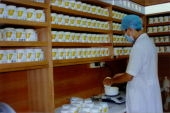 Many
TCM practitioner today are using more convenient forms of powder,
capsule or tablet, pills etc. instead of cooking the herbal tea
by yourself. However, the direct cooking still has the tea's best
value, particular for those patients who want their diseases recovered
more quickly.
Many
TCM practitioner today are using more convenient forms of powder,
capsule or tablet, pills etc. instead of cooking the herbal tea
by yourself. However, the direct cooking still has the tea's best
value, particular for those patients who want their diseases recovered
more quickly.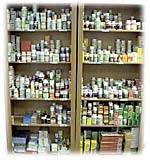
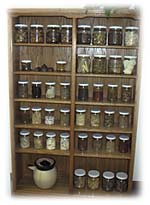
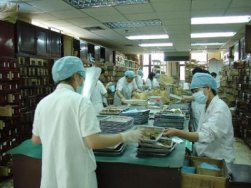
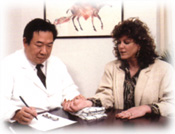 such
as taking the patient's pulse on both wrists and observing the tongue,complexion
and other signs. The three pulses felt on each wrist correspond
to the major body organs and functions. The practitioner should
explain the nature of your problem and the recommended treatment.
such
as taking the patient's pulse on both wrists and observing the tongue,complexion
and other signs. The three pulses felt on each wrist correspond
to the major body organs and functions. The practitioner should
explain the nature of your problem and the recommended treatment.
 The pulse diagnosis
could let your acupuncturist/herbalist Doctor understand your inner
organ's condition, just like an M.D. using stethoscope to find out
what's wrong in your body.
The pulse diagnosis
could let your acupuncturist/herbalist Doctor understand your inner
organ's condition, just like an M.D. using stethoscope to find out
what's wrong in your body.